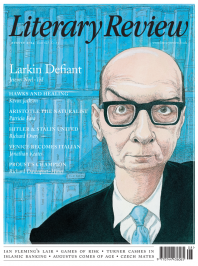Jeremy Noel-Tod
Verse and Worse
Philip Larkin: Life, Art and Love
By James Booth
Bloomsbury 532pp £25
Like the Thatcherite Tories he supported in his later years, Philip Larkin, who died in 1985, has now undergone two decades of detoxification. The contamination was quick and calamitous. Anthony Thwaite’s volume of Selected Letters in 1992 and Andrew Motion’s biography in 1993 both provided ready evidence that Britain’s favourite postwar poet had been – as well as a charming and witty personal intimate – a pornography-hoarding philanderer and casual racist. As he signed off in prophetic mockery to one correspondent: ‘Ooh, Larkin, I’m sorry to find you holding these views.’
James Booth recently retired from the English department at the University of Hull, where Larkin worked for most of his life as librarian. Since the 1990s Booth has been one of the poet’s most diligent posthumous restorers. A leading figure in the Philip Larkin Society and its neatly named magazine,

Sign Up to our newsletter
Receive free articles, highlights from the archive, news, details of prizes, and much more.@Lit_Review
Follow Literary Review on Twitter
Twitter Feed
It wasn’t until 1825 that Pepys’s diary became available for the first time. How it was eventually decrypted and published is a story of subterfuge and duplicity.
Kate Loveman tells the tale.
Kate Loveman - Publishing Pepys
Kate Loveman: Publishing Pepys
literaryreview.co.uk
Arthur Christopher Benson was a pillar of the Edwardian establishment. He was supremely well connected. As his newly published diaries reveal, he was also riotously indiscreet.
Piers Brendon compares Benson’s journals to others from the 20th century.
Piers Brendon - Land of Dopes & Tories
Piers Brendon: Land of Dopes & Tories - The Benson Diaries: Selections from the Diary of Arthur Christopher Benson by Eamon Duffy & Ronald Hyam (edd)
literaryreview.co.uk
Of the siblings Gwen and Augustus John, it is Augustus who has commanded most attention from collectors and connoisseurs.
Was he really the finer artist, asks Tanya Harrod, or is it time Gwen emerged from her brother’s shadow?
Tanya Harrod - Cut from the Same Canvas
Tanya Harrod: Cut from the Same Canvas - Artists, Siblings, Visionaries: The Lives and Loves of Gwen and Augustus John by Judith Mackrell
literaryreview.co.uk